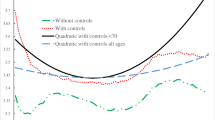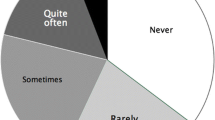Abstract
The Great Recession forced many people around to cut back on consumption and is one reason that drives the rise of right-wing forces. One response to the downturn has been a call for a return to high-level growth and consumption of goods. By contrast, this paper argues in favor of an alternative conception of the good life. To defend this thesis, it first surveys the social science literature regarding the relationship between income and happiness, noting that the growth of the former does not necessarily translate to improvements in the latter. Next, it provides a number of explanations of why greater income and consumption often do not yield greater happiness. The paper then goes on to discuss historical and theoretical alternatives to consumerism-driven life and society. Finally, it discusses how happiness can best be found in socializing with others, participating in the community, and engaging in spiritual and intellectual pursuits. The paper, thus, concludes that human contentment and flourishing is perhaps best found outside of the high-growth, high-consumption paradigm. Moreover, it finds that such a new normal is not only protective of the environment, but also enhances social justice.
Similar content being viewed by others
Notes
“Americans Still Cutting Back.”
Ibid.
The two figures ($20,000 and $75,000 per year) are not directly comparable. The first measures a nation’s average income; the second comments on individual income.
Further evidence supporting that such judgments are contextual can be found in Schwarz and Strack (1999)).
Nussbaum notes that throughout almost the entire canon of Western philosophy, almost all schools of thought refuse to identify “happiness” with psychological “pleasure.”
Martin Seligman, as cited in Senior (2010)
National Park Service. The shakers. http://www.nps.gov/nr/travel/shaker/shakers.htm
References
Andrews, F. M., & Withey, S. B. (1976). Social indicators of well-being: Americans’ perceptions of life quality. New York: Plenum Press.
Batson, D. C., & Powell A. A. (2003). Altruism and prosocial behavior. Handbook of Psychology. Three: 463–484. Hoboken, NJ: John Wiley & Sons, Inc.
Becker, G. S. (1976). Altruism, egoism, and genetic fitness: economics and sociobiology. Journal of Economic Literature, 14(3), 817–826.
Bendix, R. (1977). Max Weber: an intellectual portrait (p. 124). California: University of California Press.
Bok, D. (2010). The politics of happiness: what government can learn from the new research on well being (p. 19). Princeton: Princeton University Press.
Bourdieu, P. (1986). The forms of capital. In J. G. Richardson (Ed.), Handbook of theory and research for the sociology of education (pp. 241–258). New York: Greenwood Press.
Brickman, P., Coates, D., & Janoff-Bulman, R. (1978). Lottery winners and accident victims: is happiness relative? Journal of Personality and Social Psychology, 36(8), 917–927.
Brown, K. W., & Kasser, T. (2005). Are psychological and ecological well-being compatible? The role of values, mindfulness, and lifestyle. Social Indicators Research, 74, 349–368.
Bruni, L., & Porta, P. L. (2005). Introduction. In L. Bruni & P. L. Porta (Eds.), Economics and happiness: framing the analysis (p. 20). New York: Oxford University Press.
Bureau of Labor Statistics. (2014). Labor Force Statistics from the Current Population Survey. http://data.bls.gov/timeseries/LNS11300000. Accessed 24 Jan 2014.
Cacioppo, J., & Hawkley, L. C. (2003). Social Isolation and Health, with an Emphasis on Underlying Mechanisms. Perspectives on Biology and Medicine, 46(3), (pp. S39-S52).
Coibion, O., Gorodnichenko, Y., Koustas D. (2013). Amerisclerosis? The puzzle of rising U.S. unemployment persistence. The Brookings Institution. http://www.brookings.edu/~/media/Projects/BPEA/Fall%202013/2013b%20coibion%20unemployment%20persistence.pdf
Diener, E., Horwitz, J., & Emmons, R. A. (1985). Happiness of the very wealthy. Social Indicators Research, 16(3), 263–274.
Dorling, D. (2010). Injustice: why social inequalities persist. Bristol: Policy Press.
Dorning, M. (2013). Americans turn on Washington, 68% say wrong track in poll. Bloomberg. http://www.bloomberg.com/news/2013-09-25/americans-turn-on-washington-68-say-wrong-track-in-poll.html
Easterlin, R. (1973). Does money buy happiness. The Public Interest, 30, 3–10.
Easterlin, R. (1974). Does economic growth improve the human lot? Some empirical evidence. In P. A. David & M. W. Reder (Eds.), Nations and households in economic growth: essays in honor of Moses Abramovitz. New York: Academic Press.
Easterlin, R. (2005). Diminishing marginal utility of income? Caveat emptor. Social Indicators Research, 70(3), 243–255.
Easterlin, R., McVey, L. A., Switek, M., Sawangfa, O., & Zweig, J. S. (2010). The happiness–income paradox revisited. PNAS, 107(52), 22463–22468.
Etzioni, A. (1996). The new golden rule: community and morality in a democratic society. New York: Basic Books.
Etzioni, A. (1998). The moral dimension: toward a new economics. New York: The Free Press.
Etzioni, A. (2004). From empire to community. New York: Macmillan.
Euro RSCG Worldwide. (2010). Prosumer report: the emergence of the new consumer. Euro RSCG Knowledge Exchange. http://www.thenewconsumer.com/wp-content/uploads/2010/11/Prosumer_Report_New_Consumer_Presentation.pdf, p. 20.
Frank, R. H. (2007). Falling behind: how rising inequality harms the middle class (pp. 29–42). California: University of California Press.
Freedman, J. L. (1978). Happy people: what happiness is, who has it, and why. New York: Harcourt Brace Jovanovich.
Frey, B. S., & Stutzer, A. (2000). Happiness prospers in democracy. Journal of Happiness Studies, 1, 79–102.
Friedman, B. (2006). The moral consequences of economic growth. New York: Vintage Books.
Gallup. Confidence in institutions. (2013). http://www.gallup.com/poll/1597/confidence-institutions.aspx#1
Goffman, E., & Helmreich, W. B. (1961). Asylums: essays on the social situation of mental patients and other inmates (Vol. 277). New York: Anchor Books.
Harrison, J. (1986). Egoism, altruism, and market illusions: the limits of law and economics. UCLA Law Review, 33.
Helliwell, J. F. (2003). Well-being, social capital and public policy: what’s new? Economic Modelling, 20(2), 331–360.
Hopkins, E. (2008). Inequality, happiness and relative concerns: what actually is their relationship? Journal of Economic Inequality, 6, 351–372.
Ingram & Katic I. (2012, August 16). Does income inequality matter for life satisfaction? Paper presented at the annual meeting of the American Sociological Association Annual Meeting, Colorado Convention Center and Hyatt Regency, Denver, CO.
Jacob, J. C., & Brinkerhoff, M. B. (1997). Values, performance and subjective well-being in the sustainability movement: an elaboration of multiple discrepancy theory. Social Indicators Research, 42(2), 171–204.
Jargon J. (2010). Wealthy take bigger helping of fast food. Wall Street Journal. http://online.wsj.com/article/SB10001424052748703431604575522080669507478.html.
Kahneman, D. (1999). Objective happiness. In D. Kahneman, E. Diener, & N. Schwarz (Eds.), Well-being: the foundations of hedonic psychology (pp. 3–25). New York: Sage.
Kahneman, D., & Deaton, A. (2010). High income improves evaluation of life but not emotional well-being. Proceedings of the National Academy of Sciences of the United States of America, 107(38), 16489–16493.
Knight, J., & Gunatilaka, R. (2012). Income, aspirations and the hedonic treadmill in a poor society. Journal of Economic Behavior & Organization, 82(1), 67–81.
Lane, R. E. (1993). Does money buy happiness? The Public Interest, 113, 56–65.
Layard, R. (2005). Happiness: lessons from a new science (pp. 32–35). New York: Penguin.
Magen, Z. (1996). Commitment beyond the self and adolescence: the issue of happiness. Social Indicators Research, 37(3), 235–267.
Myers, D. G., & Diener, E. (1995). Who is happy. Psychological Science, 6(1), 12–13.
Myers, D. G., & Diener, E. (1996). The pursuit of happiness. Scientific American, 274(5), 70–72.
Newport, F. (2009). In U.S., 32% Say Spending Less Is Their New Normal. GALLUP Economy. http://www.gallup.com/poll/118003/say-spending-less-new-normal.aspx
Nussbaum, M. (2005). Mill between Aristotle and Bentham. In L. Bruni & P. L. Porta (Eds.), Economics and happiness: framing and analysis (p. 173). New York: Oxford University Press.
Packard, V., & Abbott, B. (1963). The status seekers: an exploration of class behaviour in America. New York: Penguin.
Pew Research Center. (2010). How the great recession has changed life in America (pp. 7–8). Washington D.C.: Pew Research Center.
Posner, R. A. (2012). Working 9 to 12. The New York Times. http://www.nytimes.com/2012/08/19/books/review/how-much-is-enough-by-robert-skidelsky-and-edward-skidelsky.html.
Putnam, R. D. (1995). Bowling alone: America’s declining social capital. Journal of Democracy, 6(1), 65–78.
Putnam, R. D., & Campbell, D. E. (2010). American grace: how religion divides and unites us (p. 490). New York: Simon and Schuster.
Ricard, M. (2000). Happiness: a guide to developing life’s most important skill (p. 19). New York: Brown.
Riesman, D. (1993). Abundance for what? New Brunswick: Transaction.
Ross, W. D., trans (1987). Aristotle, The Niocomachean Ethics. Amherst: Prometheus Books. p. 54. I.4 [2].
Sachs, J. D. (2013). Restoring virtue ethics in the quest for happiness. In: John Helliwell, Richard Layard, and Jeffrey Sachs (eds). World Happiness Report 2013. p. 85.
Schor, J. (2010). Plenitude: the new economics of true wealth. New York: Penguin Press.
Schwarz, N., & Strack, F. (1999). Reports of subjective well-being: judgmental processes and their methodological implications. Well-being: The Foundations of Hedonic Psychology (pp. 61–84). New York: Sage.
Sen, A. (1999). Development as freedom. New York: Knopf.
Senior, J. (2006). Some dark thoughts on happiness. New York Magazine. http://nymag.com/news/features/17573/
Senior, J. (2010). All joy and no fun. New York Magazine. http://nymag.com/news/features/67024/index5.html#print
Skidelsky, R., & Skidelsy, E. (2012). How much is enough? Money and the good life (pp. 162–163). New York: Other Press.
Steinmetz, K. (2013). The 9%: Congress’s approval rating hits the single digits. TIME. http://swampland.time.com/2013/11/12/the-9-congress-approval-rating-hits-the-single-digits/
Stevenson, B., & Wolfers, J. (2008). Economic growth and subjective well-being: reassessing the Easterlin Paradox. Brookings Papers on Economic Activity, Economic Studies Program, The Brookings Institution, 39(1), 1–102.
Strack, F., Schwarz, N., Chassein, B., Kern, D., & Wagner, D. (1990). Salience of comparison standards and the activation of social norms: consequences for judgements of happiness and their communication. British Journal of Social Psychology, 29(4), 303–314.
Sugden, R. (2005). Correspondence of sentiments: an explanation of the pleasure of social interaction. In L. Bruni & P. L. Porta (Eds.), Economics and happiness: framing the analysis (pp. 97–98). New York: Oxford University Press.
Tarnas, R. (1991). The passion of the Western mind: understanding the ideas that have shaped our world view. Ballantine Books, 1991, 58.
The Economist. (2010). Economic focus: the joyless or the jobless, p 84.
The Economist. (2012). The last Kodak moment? http://www.economist.com/node/21542796.
The Economist. (2014). Coming to an office near you. http://www.economist.com/news/leaders/21594298-effect-todays-technology-tomorrows-jobs-will-be-immenseand-no-country-ready
Veenhoven, R., & Hagerty, M. (2006). Rising happiness in nations 1946–2004: a reply to Easterlin. Social Indicators Research, 79, 421–436.
Veenhoven, R., & Vergunst, F. (2013). The Easterlin illusion: economic growth does go with greater happiness. EHERO working paper. http://mpra.ub.uni-muenchen.de/43983/1/MPRA_paper_43983.pdf
Wang, S. (2007). Aquinas on human happiness and the natural desire for God. New Blackfriars, 88(1015), 322–334 (p. 322).
Wilkinson, R. G., & Pickett, K. (2011). The spirit level. New York: Bloomsbury Press.
Author information
Authors and Affiliations
Corresponding author
Additional information
I am indebted to Jesse Spafford for his extensive research assistance on this article.
Rights and permissions
About this article
Cite this article
Etzioni, A. Politics and Culture in an Age of Austerity. Int J Polit Cult Soc 27, 389–407 (2014). https://doi.org/10.1007/s10767-014-9173-z
Published:
Issue Date:
DOI: https://doi.org/10.1007/s10767-014-9173-z




